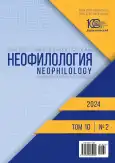Secondary evaluative categorization of educational activities in English
- Authors: Finaeva E.A.1
-
Affiliations:
- Derzhavin Tambov State University
- Issue: Vol 10, No 2 (2024)
- Pages: 366-377
- Section: LANGUAGES OF PEOPLES OF FOREIGN COUNTRIES (GERMANIC LANGUAGES)
- URL: https://journal-vniispk.ru/2587-6953/article/view/295599
- DOI: https://doi.org/10.20310/2587-6953-2024-10-2-366-377
- ID: 295599
Cite item
Full Text
Abstract
INTRODUCTION. We examine the secondary evaluative categorization of educational activities in English. Secondary evaluative categorization is based on already formed knowledge obtained through experience, which is the basis for the processes of cognitive modeling, represented by metaphorical, metonymic, metaphtonymic models and conceptual comparison. The identified types of modeling, which are activated in the processes of secondary evaluative categorization of educational activities, lead to the formation of inferential knowledge of the evaluative type which reveals the specifics of evaluative focus in the domain of educational activities. The figurative nature of such knowledge helps to enhance the expressive potential of the statement.MATERIALS AND METHODS. The methodological basis of this study is the method of cognitive modeling, which allows us to comprehend the hidden processes of formation of secondary evaluative knowledge. The works of domestic and foreign scientists were used as material for theoretical analysis. The material for practical analysis was the examples obtained by the method of continuous sampling from the enclosures (BNC, COCA). Journalistic texts, data from English-language dictionaries and Internet information resources were also used as illustrative material.RESULTS AND DISCUSSION. The research shows that the evaluative knowledge about educational activities is presented in the form of ethical, normative, psychological, utilitarian and teleological evaluations. The objects of evaluation are the characteristics of the concept UPBRINGING. The analysis proves that metaphorical modeling has the greatest potential in the formation of secondary evaluative knowledge, since in the process of such modeling the observer’s attention is focused on a larger number of aspects of educational activity, and the largest number of types of evaluative knowledge in comparison with other cognitive models.CONCLUSION. The prospect of the study lies in the possibility of using the given results in the research of secondary evaluative categorization of other objects and in the study of the processes of cognitive modeling in the formation of evaluation.
About the authors
E. A. Finaeva
Derzhavin Tambov State University
Author for correspondence.
Email: liza.finaeva@yandex.ru
ORCID iD: 0000-0001-7021-0327
Cand. Sci. (Philology), Assistant of Foreign Philology and Applied Linguistics Department
Internatsionalnaya 33 St., Tambov, 392000, Russian FederationReferences
- БBoldyrev N.N. Kognitivnaya semantika. Vvedenie v kognitivnuyu lingvistiku [Cognitive Semantics. Intro-duction to Cognitive Linguistics]. Tambov, Derzhavin Tambov State University Publishing House, 2021, 236 p. https://elibrary.ru/fsskuz
- Furs L.A. cognitive basis of world interpretation in syntax. Kognitivnye issledovaniya yazyka = Cognitive Stu-dies of Language, 2016, no. 25, pp. 784-789. (In Russ.) https://doi.org/10.20916/2071-9639-2016-25-784-789, https://elibrary.ru/wisecf
- Boldyrev N.N. Evaluative conceptualization as a factor of dynamics of the language view of the world. In: Lip-gart A.A., Mendzheritskaya E.O., Mikhailovskaya E.V., Fomina I.N. (eds.). Sbornik nauchnykh statei k yubileyu doktora filologicheskikh nauk, professora Ol’gi Viktorovny Aleksandrovoi «Aleksandrovskii sbornik» [Proceedings for the Anniversary of Dr. habil (Philology), Professor Ul’ga Viktorovna Alexandrova “Alexandrova’s Collection”]. Moscow, NaukaPubl., 2022, pp. 46-57. (In Russ.) https://elibrary.ru/xacrke
- Vol’f E.M. Otsenochnoe znachenie i sootnoshenie priznakov «khorosho/plokho» // Voprosy yazykoznaniya. 1986. № 5. pp. 98-107 (In Russ.) Available at: https://vja.ruslang.ru/archive/1986-5.pdf
- Arutyunova N.D. Tipy yazykovykh znachenii [Types of linguistic values]. Otsenka, sobytie, fakt [Assessment, Event, Fact]. Moscow, Nauka Publ., 1988, 339 p. (In Russ.)
- Arutyunova N.D. Yazyk i mir cheloveka [Language and the Human World]. Moscow, Yazyki russkoi kul’tury Publ., 1998, 895 p. (In Russ.)
- Stolyar E.D. Value meaning creation in language. Voprosy kognitivnoi lingvistiki = Issues of Cognitive Linguis-tics, 2019, no. 2, pp. 41-48. (In Russ.) https://doi.org/10.20916/1812-3228-2019-2-41-48, https://elibrary.ru/zbmwmp
- Boldyrev N.N. The interpretive function of secondary structures in the linguistic worldview. Kognitivnye issle-dovaniya yazyka = Cognitive Studies of Language, 2022, no. 1(48), pp. 19-79. (In Russ.) https://elibrary.ru/orjokc
- Magirovskaya O.V. Antropotsentrichnost’ kontseptual’noi organizatsii yazyka [Anthropocentricity of the con-ceptual organization of language]. Vestnik Krasnoyarskogo gosudarstvennogo pedagogicheskogo universiteta im. V.P. Astaf'eva (Vestnik KGPU) = Bulletin of Krasnoyarsk State Pedagogical University Named After V.P. Astafyev (Bulletin KSPU), 2006, no. 3, pp. 53-56. (In Russ.) https://elibrary.ru/jxvdzx
- Furs L.A. Regulating function of evaluative categories. Kognitivnye issledovaniya yazyka = Cognitive Studies of Language, 2016, no. 24, pp. 657-665. (In Russ.) https://doi.org/10.20916/2071-9639-2016-24-657-665, https://elibrary.ru/wwrgcz
- Furs L.A. Secondary representation of knowledge in English syntax. Kognitivnye issledovaniya yazyka = Cogni-tive Studies of Language, 2022, no. 1 (48), pp. 273-288. (In Russ.) https://elibrary.ru/mswaos
- Furs L.A. Cognition and cognitive dynamics. Voprosy kognitivnoi lingvistiki = Issues of Cognitive Linguistics, 2021, no. 3, pp. 52-58. (In Russ.) https://doi.org/10.20916/1812-3228-2021-3-52-58, https://elibrary.ru/ltyqvq
- Lakoff Dzh., Dzhonson M. Metafory, kotorymi my zhivem [Metaphors We Live By]. Moscow, Editorial URSS Publ., 2004, 256 p. (In Russ.)
- Cherkasova A.A. Reflections on metaphorization as a cognitive mechanism. Kognitivnye issledovaniya yazyka = Cognitive Studies of Language, 2021, no. 3 (46), pp. 92-96. (In Russ.) https://elibrary.ru/yzawxi
- Kоvecses Z. Where Metaphors Come From. Oxford, Oxford University Press, 2015, 232 p.
- Kоvecses Z. Metaphor: A practical introduction. Oxford, Oxford University Press, 2010, 400 p.
- Goossens L. Metaphtonymy: The interaction of metaphor and metonymy in expressions of linguistic action. Cognitive Linguistics. Berlin, New York, Mouton de Gruyter Publ., 1990, pp. 323-340. https://doi.org/10.1515/cogl.1990.1.3.323
- Furs L.A., Finaeva E.A. Development of evaluative knowledge about educational activities in modern English. Neofilologiya = Neophilology, 2021, vol. 7, no. 28, pp. 626-635. (In Russ.) https://doi.org/10.20310/2587-6953-2021-7-28-626-635, https://elibrary.ru/mjahkk
Supplementary files









